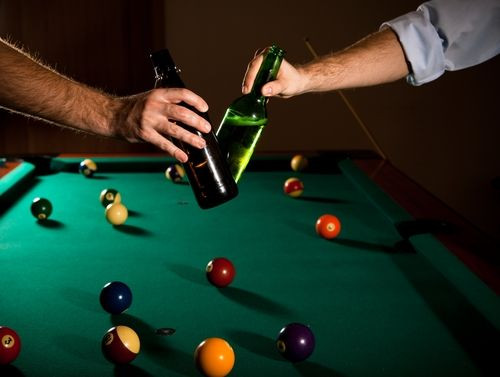Healthy Aging: A Pool Table And A Pint Of Beer Help Improve Quality Of Life For Older Men

Men, it’s time to round up the guys and head to the bar to say cheers to your health, literally. Science has got your back when it comes to your health, and suggests a pint of beer and a pool table are two essentials for healthy aging. According to a recent study from the University of Copenhagen, Denmark, drinking beer while playing a game of billiards with friends can help keep men active and combat the aging process.
“Thirty years ago, the elderly were not expected to be active at all — they were actually advised not to exercise as it was considered dangerous. Playing cards were seen as a more fitting activity. Today, we are all expected to live active, healthy lives until the day we die — in good health — at the age of 90. Old age has, in a sense, been cancelled,” said Aske Juul Lassen, study author and anthropologist from University of Copenhagen’s Center for Healthy Aging, in a news release.
Active aging has strictly been equated with health, but there are social and health benefits from activities that do not necessarily fit into the official lifestyle recommendations of the European Union (EU) and the World Health Organization (WHO). Adults who are aged 65 and above can meet their physical activity requirements in the form of walking, dancing, gardening, hiking, swimming, and in other non-traditional forms like playing games, says WHO. These moderate-intensity aerobic physical activities should be in the form of at least 150 minutes of moderate-intensity aerobic physical activity throughout the week or doing at least 75 minutes of vigorous-intensity aerobic physical activity throughout the week or an equivalent combination of moderate- and vigorous-intensity activity.
Lassen believes playing pool, or billiards, is the perfect exercise due to its long periods of rest between activity. To observe the effects of playing pool in a local community and social setting, the anthropologist conducted field work in two activity centers for the elderly in Copenhagen, where up to one in 15 men between the ages of 70 and 95 meet to play billiards four times a week. "Playing billiards often comes with a certain lifestyle, drinking beer and drams for instance, and I am quite sure this was not what WHO and EU meant when they formulated their active ageing policies,” Lassen said.
However, Lassen has found pool is an activity older men enjoy, and this is what enhances their quality of life while they are socially active in their local communities. Pool can be a suitable exercise for the elderly because the game varies between periods of activity and passivity, which means these men can continue playing for hours without feeling depleted. Pool is a physical activity that can last hours and hours on end, but unlike more strenuous exercises, it also encourages long periods of rest with less intensity.
Lassen proposes “billiards and beer” should be included in the official policy papers on “active ageing” issued by the WHO and the EU. He places emphasis on the positive side effects of these activities that allow the elderly to take their minds off their illness and engage in activities like billiards that activity centers offer. Therefore, Lassen concludes there should be a broader, more inclusive concept of healthy and active aging so it can positively impact the everyday lives, quality of life, and general health of the elderly.
This advice coincides with a 2010 study published in the journal Alcoholism: Clinical and Experimental Research, which found people who drink alcohol regularly may actually live longer than those who are heavy drinkers and tee-total. “Moderate” drinkers were defined as those who consumed one to three drinks per day. Moderate alcohol use, especially when the beverage of choice is red wine, is thought to improve heart health, circulation and sociability, which is important for people who are isolated and don’t have many family or friends that can spot these health problems.
It seems older folk should all go down to the bar — for their health’s sake.
Sources: Lassen AJ et al. Active ageing is much more than exercise. University of Copenhagen, Denmark. 2014.
Brennan PL, Holahan CK, Holahan CJ et al. Late-Life Alcohol Consumption and 20-Year Mortality. Alcoholism: Clinical and Experimental Research. 2010.
Published by Medicaldaily.com



























